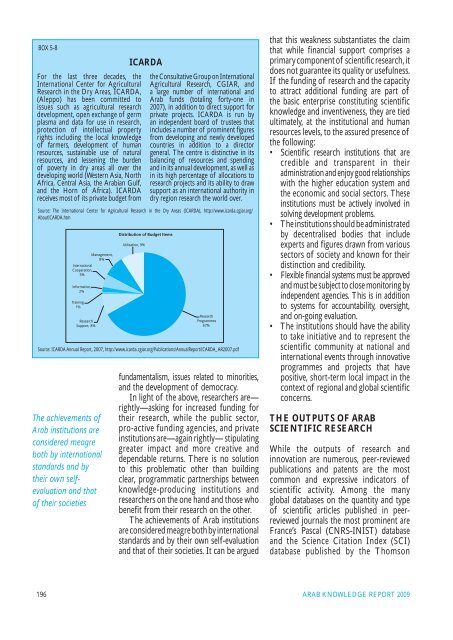Arab Knowledge Report 2009: Towards Productive
Arab Knowledge Report 2009: Towards Productive
Arab Knowledge Report 2009: Towards Productive
- No tags were found...
You also want an ePaper? Increase the reach of your titles
YUMPU automatically turns print PDFs into web optimized ePapers that Google loves.
BOX 5-8For the last three decades, theInternational Center for AgriculturalResearch in the Dry Areas, ICARDA,(Aleppo) has been committed toissues such as agricultural researchdevelopment, open exchange of germplasma and data for use in research,protection of intellectual propertyrights including the local knowledgeof farmers, development of humanresources, sustainable use of naturalresources, and lessening the burdenof poverty in dry areas all over thedeveloping world (Western Asia, NorthAfrica, Central Asia, the <strong>Arab</strong>ian Gulf,and the Horn of Africa). ICARDAreceives most of its private budget fromICARDAthe Consultative Group on InternationalAgricultural Research, CGIAR, anda large number of international and<strong>Arab</strong> funds (totaling forty-one in2007), in addition to direct support forprivate projects. ICARDA is run byan independent board of trustees thatincludes a number of prominent figuresfrom developing and newly developedcountries in addition to a directorgeneral. The centre is distinctive in itsbalancing of resources and spendingand in its annual development, as well asin its high percentage of allocations toresearch projects and its ability to drawsupport as an international authority indry region research the world over.Source: The International Center for Agricultural Research in the Dry Areas (ICARDA), http://www.icarda.cgiar.org/AboutICARDA.htmInternationalCooperation,5%Information,2%Training,1%ResearchSupport, 8%Management,8%Distribution of Budget ItemsUtilisation, 9%ResearchProgrammes67%Source: ICARDA Annual <strong>Report</strong>, 2007, http://www.icarda.cgiar.org/Publications/Annual<strong>Report</strong>/ICARDA_AR2007.pdfThe achievements of<strong>Arab</strong> institutions areconsidered meagreboth by internationalstandards and bytheir own selfevaluationand thatof their societiesfundamentalism, issues related to minorities,and the development of democracy.In light of the above, researchers are—rightly—asking for increased funding fortheir research, while the public sector,pro-active funding agencies, and privateinstitutions are—again rightly— stipulatinggreater impact and more creative anddependable returns. There is no solutionto this problematic other than buildingclear, programmatic partnerships betweenknowledge-producing institutions andresearchers on the one hand and those whobenefit from their research on the other.The achievements of <strong>Arab</strong> institutionsare considered meagre both by internationalstandards and by their own self-evaluationand that of their societies. It can be arguedthat this weakness substantiates the claimthat while financial support comprises aprimary component of scientific research, itdoes not guarantee its quality or usefulness.If the funding of research and the capacityto attract additional funding are part ofthe basic enterprise constituting scientificknowledge and inventiveness, they are tiedultimately, at the institutional and humanresources levels, to the assured presence ofthe following:• Scientific research institutions that arecredible and transparent in theiradministration and enjoy good relationshipswith the higher education system andthe economic and social sectors. Theseinstitutions must be actively involved insolving development problems.• The institutions should be administratedby decentralised bodies that includeexperts and figures drawn from varioussectors of society and known for theirdistinction and credibility.• Flexible financial systems must be approvedand must be subject to close monitoring byindependent agencies. This is in additionto systems for accountability, oversight,and on-going evaluation.• The institutions should have the abilityto take initiative and to represent thescientific community at national andinternational events through innovativeprogrammes and projects that havepositive, short-term local impact in thecontext of regional and global scientificconcerns.THE OUTPUTS OF ARABSCIENTIFIC RESEARCHWhile the outputs of research andinnovation are numerous, peer-reviewedpublications and patents are the mostcommon and expressive indicators ofscientific activity. Among the manyglobal databases on the quantity and typeof scientific articles published in peerreviewedjournals the most prominent areFrance’s Pascal (CNRS-INIST) databaseand the Science Citation Index (SCI)database published by the Thomson196 ARAB KNOWLEDGE REPORT <strong>2009</strong>
















